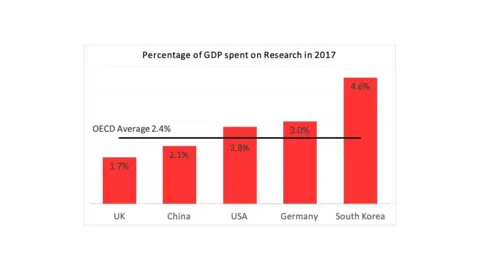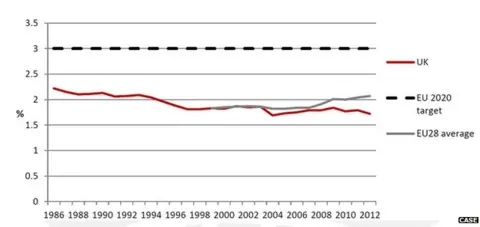Ministers told back up science vision or risk UK stagnation
 JAMES KING-HOLMES/SCIENCE PHOTO LIBRARY
JAMES KING-HOLMES/SCIENCE PHOTO LIBRARYA £20bn investment is needed if the government is to achieve its vision of a science-led economy, according to a new analysis.
The Campaign for Science and Engineering (Case) is calling for the boost in UK science funding to avoid the risk of "stagnation".
The UK currently ranks 23rd in its R&D spending as a proportion of GDP.
Case said now was the time for the government to set out details of its plan.
"The government has set out a bold vision for UK science," said executive director, Dr Sarah Main.
"It is a potentially transformative one for the entire country. But now is the time for it to put some substance to the plan."
 Campaign for Science and Engineering
Campaign for Science and EngineeringIn 2017 the Chancellor Philip Hammond announced a government target to increase public and private research investment from 1.7% of GDP to 2.4% of GDP by 2027.
The UK currently ranks 23rd in its R&D spending as a proportion of GDP, behind Iceland and Norway. The Government has already pledged an additional £7bn to UK R&D by 2022. But, according to Case, the government has to treble that investment over the following five years if it is to reach its target. This would mean making a commitment to invest £21bn.
The investment would raise Britain's ranking to 13th if other countries maintained their level of spending. But the UK would still be below Belgium.
'Scale and urgency'
James Wilsdon, who is professor of research policy at Sheffield University, said that the report was a timely reminder of the "scale and urgency" of the funding of UK science at a time when the minds of politicians have been dominated by Brexit.
"As the beauty parade gets underway for a new PM and leader of the Conservative party, anyone who cares about the long-term economic prospects of the nation should be judging candidates by the seriousness of their commitment to the 2.4% of GDP goal.
"Earlier this month, the German government pledged year-on-year increases of 3% in its research spending up to 2027. As Case shows, if we're to even stand still, let alone move into the premier league of global R&D spenders, we need to see a similarly ambitious plan from the UK government."
Case's report is drawn from a survey of its membership which includes over 100 organisations, including businesses, universities, learned and professional organisations and research charities. They say that a £21bn pledge could attract an additional £27.5bn of research investment from private sources over 15 years.
Its report warns that a failure to provide such an uplift would lead to "stagnation". It also calls for a clear strategy on how the increased money is to be spent effectively.
Case recommends that an early priority should be to increase the number of people studying postgraduate degrees to avoid a skills shortage when the fruits of the investment in research begin to come through.
 Case
CasePart of this push should include efforts by the UK Research and Innovation agency (UKRI), which directs research funding, to increase the number of under-represented groups studying science. These include women, people from poorer backgrounds, disabled individuals and black students.
Diversity
According to Dr Main, this would entail collecting data on the diversity of those studying science and assessing the approaches that are effective.
"The issue of who is employed and engaged in science is not just to feed the workforce," she explained.
"It is to make sure that in ten years' time, after this huge amount of money has been invested, that more people across the UK can have a stake in it, that they have a say in how research is used and how it affects their lives.
"And that this huge change is something that they can be part of and benefit from."
The report also says that it should be easier for firms to access the myriad of funds and incentives available for research.
A spokesperson from the Department for Business Energy and Industrial Strategy, which is responsible for research, welcomed the report and its recommendations.
"The government is investing record levels into research and development, while working closely with stakeholders to fuel investment in the private sector to ensure we become the global leaders in new and emerging technologies and secure highly-skilled jobs and investment in all parts of the country."
Follow Pallab on Twitter
